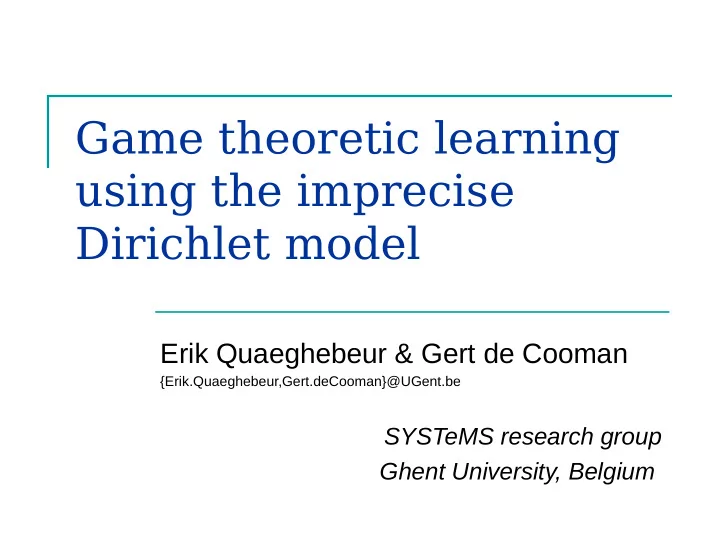

Game theoretic learning using the imprecise Dirichlet model Erik Quaeghebeur & Gert de Cooman {Erik.Quaeghebeur,Gert.deCooman}@UGent.be SYSTeMS research group Ghent University, Belgium
My promoter, myself and my research Presented research: master’s thesis cont’d PhD-research started last fall Current research: Using the IDM for learning in Markov models Research interests: the IDM and its applications, learning models Research detour: imprecise central moments
Two players in strict competition, but hey, it’s only a game Yourself and one opponent His loss, your gain (and vice-versa) Playing: choosing a strategy Afterwards: the pay-off, positive or negative Strategies: from pure to mixed The expected payoff
Model your uncertainty, take an IDM You, the player, think/suppose that your opponent plays an unknown, fixed, strategy Why uncertainty in the model: to allow you to make an informed strategy choice yourself Model with: a PDM or, more general, an IDM
Updating the IDM Gathering information: observing the pure strategies your opponent plays Update your IDM with the gathered observations
To play, we need to pick an optimal strategy Optimal: maximise immediate expected pay- off, perhaps minimise risk (limit losses) Use IDM and pay-off function to order the gambles One optimal strategy or a set of optimal strategies (partial order) Optimal set: no further choice, but an arbitrary one
One opponent, one game, playing over and over again Equilibrium of a game: special couple of strategies, if only you change your strategy, you’ll get less (idem for your opponent) In some cases, for a special type of equilibrium, convergence to such an equilibrium is guaranteed In all cases, if the played strategies converge, it is to an equilibrium
Conclusions What we did: generalise a learning model, replacing PDM by IDM, complete ordering of strategies by a partial ordering The resulting learning model has similar properties with regard to convergence to equilibria We obtain a more complex, but also more expressive learning model
Questions: fjre away Slide reference: Presenting myself and my research 1) Defining games: strategies and pay-off 2) Modelling uncertainty: IDM 3) Updating an IDM 4) Optimal strategies 5) Convergence to equilibria 6) Conclusions 7)
Recommend
More recommend